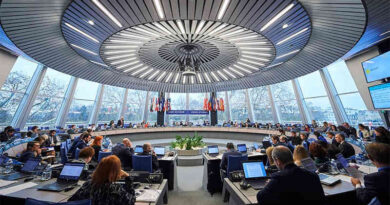Unregulated Lobbying Leads to Corruption in Europe

Transparency International said today that Europe urgently needs lobbying reform. A new report from the anti-corruption group found that of 19 European countries assessed, only 7 have some form of dedicated lobbying law or regulation, allowing for nearly unfettered influence of business interests on the daily lives of Europeans.
The 19 countries together score just 31 per cent (out of 100 per cent) when measured against international lobbying standards and best practice in the report “Lobbying in Europe: Hidden Influence, Privileged Access”.
The new report, a comprehensive assessment on lobbying in the region, studies how well political decision-making is protected from undue influence.
Related Stories:
[ Tackling Terrorism by Fighting Corruption ]
[ How Corruption Stifles Economic Growth ]
“In the past five years, Europe’s leaders have made difficult economic decisions that have had big consequences for citizens. Those citizens need to know that decision-makers were acting in the public interest, not the interest of a few select players,” said Elena Panfilova, vice-chair of Transparency International.
Despite the fact that lobbying is an integral part of a healthy democracy, multiple scandals throughout Europe demonstrate that without clear and enforceable rules and regulations, a select number of voices with more money and insider contacts can come to dominate political decision-making – usually for their own benefit, observed Transparency International.
Bureaucratic inefficiency is the worst form of corruption in India. Read Full Story
The report examines lobbying practices as well as whether safeguards are in place to ensure transparent and ethical lobbying in Europe and three core European Union institutions. It looks at whether there are sufficient mechanisms allowing fair and equal access to decision-makers.
The report makes several recommendations to ensure lobbying does not lead to corruption, including the following:
All countries and EU institutions must:
- Adopt lobbying regulation that is broad and comprehensive – capturing all who engage in lobbying activities as well as all key lobbying targets.
- Establish mandatory registers of lobbyists, recording detailed information on clients lobbyists represent, who lobbyists target, and with what resources they seek to influence which decisions.
- Ensure a “legislative footprint” is established to track and publish which external input has influenced legislation as well as what contact between lobbyists and public officials has taken place.
- Establish or amend minimum “cooling-off periods” before former public and elected officials can work in lobbying positions that may create or be seen to create conflicts of interest.
All those seeking to influence public policy must proactively publish information on their advocacy and lobbying activities and expenditure, including supporting documentation sent to decisions-makers, as well as on their political contributions and involvement, suggests Transparency International.
💛 Support Independent Journalism
If you find RMN News useful, please consider supporting us.




